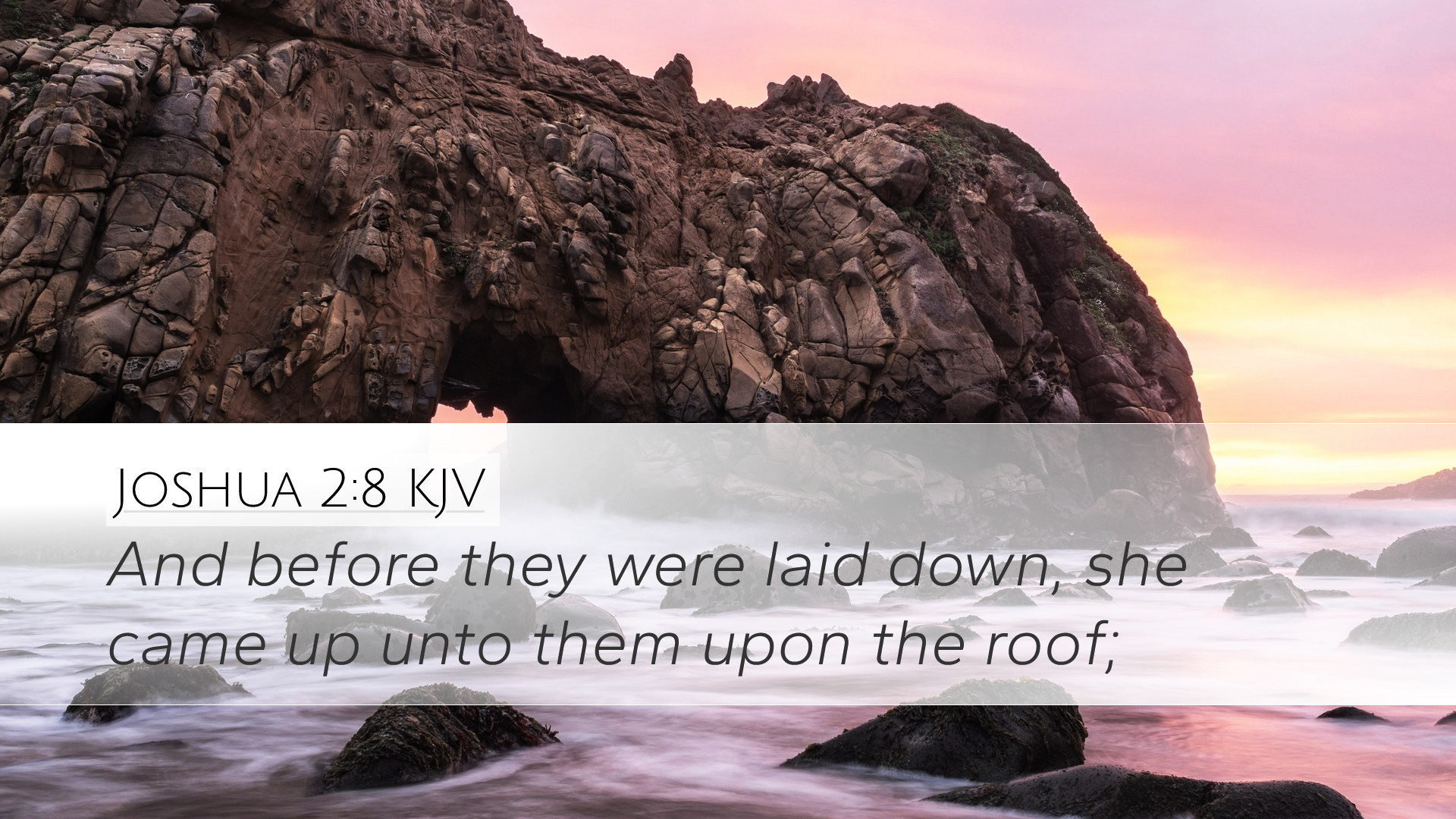Old Testament
Genesis Exodus Leviticus Numbers Deuteronomy Joshua Judges Ruth 1 Samuel 2 Samuel 1 Kings 2 Kings 1 Chronicles 2 Chronicles Ezra Nehemiah Esther Job Psalms Proverbs Ecclesiastes Song of Solomon Isaiah Jeremiah Lamentations Ezekiel Daniel Hosea Joel Amos Obadiah Jonah Micah Nahum Habakkuk Zephaniah Haggai Zechariah MalachiJoshua 2:8
Joshua 2:8 KJV
And before they were laid down, she came up unto them upon the roof;
Joshua 2:8 Bible Commentary
Commentary on Joshua 2:8
Verse Context: Joshua 2:8 states, "Before the spies lay down for the night, she went up on the roof and said to them, 'I know that the LORD has given this land to you and that a great fear of you has fallen on us...'" This is a pivotal moment in the narrative of Israel's conquest of Canaan, showcasing both faith and providence.
Overview of the Verse
This verse presents Rahab's significant declaration of faith concerning the Israelites and the God they serve. Her strategic engagement with the spies signifies not only her awareness of the current political and military climate but also her acceptance of the sovereignty of God in the affairs of men.
Theological Insights
- Recognition of God's Sovereignty: Rahab acknowledges the LORD’s direct involvement in the destiny of Israel, illustrating that even the Gentiles recognized God's power and purpose. This connects to themes found in the writings of Albert Barnes, who emphasizes that God’s oversight governs all nations.
- The Fear of the LORD: The "great fear" that has fallen on the inhabitants of Jericho echoes sentiments found in Proverbs 1:7, where the fear of the LORD is the beginning of wisdom. This fear is not simply dread but a recognition of God's majesty.
- Covenantal Faith: Rahab's actions reveal her faith and desire to be part of God's redemptive plan, which Matthew Henry notes as a critical contrast to the rest of Jericho's inhabitants who remained in unbelief.
Character Study: Rahab
Rahab, a figure of remarkable faith, is introduced as a harlot, yet her profound belief in God sets her apart. Adam Clarke notes that her profession does not define her righteousness, but rather her actions and faith in recognizing the true God.
- Transformation: Rahab’s willingness to betray her city and protect the spies represents a transformative act of faith, which demonstrates that God can redeem anyone, regardless of their past.
- Women of Faith: Throughout Scripture, God often uses women in pivotal roles. Rahab’s story is one of courage and faith, emphasizing the important roles women have in God’s narrative of redemption.
Cultural and Historical Context
The mention of Rahab's location—her house built into the city wall—highlights the precariousness of her situation. Albert Barnes contextualizes this by explaining how cities in ancient times were fortified and how Rahab’s position allowed her to act covertly to assist the spies.
- Security and Danger: Rahab’s actions were fraught with risk, reflecting the dual nature of faith that often involves stepping outside of societal norms to do God’s will.
- Sociopolitical Climate: Understanding the fear that enveloped Jericho is crucial. News of the Israelites’ miraculous journey through the Red Sea and their victories had spread widely, instilling fear in their enemies. Clarke illustrates this atmosphere of dread as a backdrop for Rahab's faith.
Faith in Action
Rahab’s decision to hide the spies and her confession convey a deeper understanding of faith. She not only believes in the God of Israel but also acts upon that belief. Matthew Henry comments on the necessity of faith that works through love, as evidenced by her protective actions towards the spies.
- Faith and Works: This is a clear illustration of James 2:25, which mentions Rahab as justified by her works when she received the spies. Rahab’s faith was not stagnant; it propelled her to action.
- Assurance in God’s Promise: Rahab’s faith grants her assurance of the coming judgment upon Jericho, knowing that her actions to protect the spies could lead to her own salvation. This typifies the New Testament assurance found in Romans 10:9-10 that professing faith in God leads to salvation.
Lessons for Modern Believers
Rahab’s story teaches contemporary believers several vital truths:
- God’s Inclusiveness: Regardless of one’s past, anyone can seek redemption through faith in God, which should inspire Christians to reach out to all, regardless of background.
- Active Faith: True faith results in action; believers are called to live out their faith in tangible ways, echoing Rahab’s exemplary behavior.
- Understanding God’s Plan: Acknowledging God's sovereignty in personal and communal histories allows believers to trust in His plans amidst uncertainty.
Conclusion
Joshua 2:8 is not merely a historical account but a rich source of theological reflection that challenges us to consider the nature of faith and the character of God. Rahab stands as a testament to how faith transcends circumstances, and her legacy encourages believers to trust in God's promises and plan for redemption.


